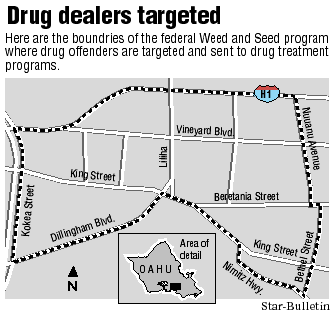

By George F. Lee, Star-Bulletin
Some of the 44 people arrested in this Kalihi drug sting on July 31
are being prosecuted under the new Weed & Seed federal program,
which imposes higher and tougher penalties. Community leaders,
though, are taking a wait-and-see stance on its effectiveness
Weed & Seed
program aims
at drug dealers
Areas are weeded of criminals,
By Lori Tighe
then seeded with prevention programs
Star-BulletinThe first thing some drug dealers and users now ask when busted in Chinatown or Kapalama: Will this go to federal or state court?
If federal court is the answer, it's bad news for them. They get no bail, no probation and, if found guilty, do prison time.
The federal crackdown effort -- normally used on traffickers smuggling pounds of drugs into Hawaii -- is now reaching small-time drug dealers in Kalihi, Palama and Chinatown.

Called "Weed & Seed," the quarter-million-dollar federal program combines law enforcement and social agencies to weed the area of criminals and then to seed the area with prevention programs.A federal grand jury has indicted 40 people in the last two months since Weed & Seed began. That's a typical number of arrests for the time period, but only five of the 40 were released on bail in federal court, said U.S. Attorney Steve Alm yesterday. The rest are in custody. If the state had handled the cases, the defendants would likely have received bail and been released.
Some of the 44 people arrested in a Kalihi drug sting several weeks ago are being prosecuted under Weed & Seed.
"We don't want people to say, 'Ah, this is just another federal program," Alm said. "This is very different and allows us to bring a real hammer over drug sellers."
But Sun Hung "Sunny" Wong, the honorary mayor of Chinatown, said he attended one Weed & Seed meeting and went home disappointed. Everyone had a wish list, yet no master plan emerged.
"We hear so many people starting programs to deter crime in this area -- like the video camera program and increased lighting -- but everything's being done piecemeal," Wong said.
Residents have voiced their reservations about Weed & Seed, asking coordinator Maile Kanemaru why it is different.
"It's taking a real attitude change on the residents' side. We're asking them to better define what is a safe community and to come up with their own benchmarks," Kanemaru said.
A $235,418 grant from the Department of Justice pays for four additional Honolulu police officers who patrol the area surrounding Mayor Wright Housing. Led by Sgt. John Kauwenaole, the officers eventually plan to operate in a Mayor Wright Housing unit. The apartment will be converted to an office and community house where anyone can drop by and chat with police.
"We're receiving mixed reactions. The crumbs don't like us; we're in their face. But the residents like us," Kauwenaole said.
The Weed & Seed money will also double the size of the Hawaii Drug Court. Begun two years ago, the drug court provides a treatment-based alternative to jail for nonviolent offenders. If offenders go through a two-year treatment program and prove they've recovered, the court will dismiss their charges. The drug court has graduated 60 people to date, with only one graduate becoming arrested again, said Tom Koenig, deputy prosecuting attorney at drug court.
Weed & Seed involves an array of agencies and experts from the FBI, Queen Liliuokalani Children's Center, United Way, University of Hawaii, the Immigration Center and the U.S. Customs Service. Schools, such as Kauluwela Elementary, are being adopted for mentoring programs. Anger management and counseling services may be offered free to the community.
"It's too early to tell the impact," said Peter Wolff, federal public defender.
He favors the seed part of the program to educate the public, but opposes the weed part of increased imprisonment.
"My prediction is, it will be as great a success as the drug war has been, which is to say a complete failure," Wolff said.
"The drug war hasn't eliminated drug sellers. Someone will always take a drug dealer's place on the streets."
Most of the small-time drug criminals will receive longer sentences in federal court than in state court, Wolff said, "but it won't make the problem go away."